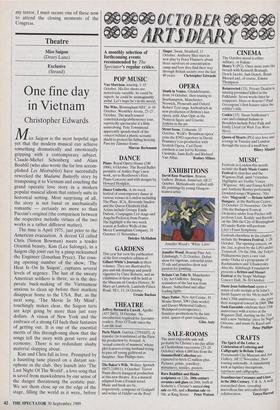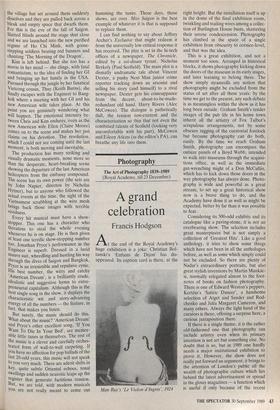Theatre
Miss Saigon (Drury Lane) Exclusive (Strand)
One fine day in Vietnam
Christopher Edwards
iss Saigon is the most hopeful sign yet that the modern musical can achieve something dramatically and emotionally gripping with a contemporary subject. Claude-Michel Schonberg and Alain Boublil (who also wrote the far less accom- plished Les Miserables) have successfully reworked the Madame Butterfly story by transposing it to Vietnam and couching the grand operatic love story in a modern popular musical idiom that entirely suits its historical setting. Most surprising of all, the story is not banal or mechanically romantic — certainly no more so than Puccini's original (the comparison between the respective melodic virtues of the two works is a rather different matter).
The time is April 1975, just prior to the American evacuation. A decent GI called Chris (Simon Bowman) meets a tender Oriental beauty, Kim (Lea Salonga), in a Saigon clip joint run by a pimp nicknamed the Engineer (Jonathan Pryce). The rous- ing opening number of the show, 'The Heat Is On In Saigon', captures several levels of urgency. The lust of the sweaty American soldiers is there, so is the des- perate buck-making of the Vietnamese anxious to clean up before their markets disappear home to the USA. But, as the next song, The Movie In My Mind', touchingly makes clear, the Saigon tarts are kept going by more than just easy dollars. A vision of New York and the embrace of a strong GI fuels their fantasies of getting out. It is one of the essential merits of this through-sung show that the songs tell the story with great verve and economy. There is no redundant slushy material slopping about.
Kim and Chris fall in love. Prompted by a haunting tune played on a distant sax- ophone in the club, they launch into 'The Last Night Of The World', a love song that is saved from mawkishness by our sense of the danger threatening the ecstatic pair. We see them close up on the edge of the stage, filling the world as it were, before the village but set around them suddenly dissolves and they are pulled back across a bleak and empty space that dwarfs them. For this is the eve of the fall of Saigon. Slatted blinds around the stage shut close and we are launched into the new purified regime of Ho Chi Minh, with goose- stepping soldiers bearing red banners and chanting 'The Morning of the Dragon'.
Kim is left behind. But she too has a movie in her mind — she clings, with fatal romanticism, to the idea of finding her GI and bringing up her family in the USA. Pursued through the jungle by her fanatical Vietcong cousin, Thuy (Keith Burns), she finally escapes with the Engineer to Bang- kok where a meeting with her GI and his new American wife takes place. At this point you are genuinely wondering what will happen. The emotional intensity be- tween Chris and Kim endures, even as the new American wife Ellen (Claire Moore) comes on to the scene and makes her just claims on his devotion. The resolution, which I could not see coming until the last moment, is both moving and inevitable.
The production has many striking and visually dramatic moments, none more so than the desperate, heart-breaking scene showing the departure of the last American helicopters from the embassy compound. The scene has its own power (the sets are by John Napier, directon by Nicholas Hytner), but to anyone who followed the actual events at the time, the sight of the Vietnamese scrabbling at the wire mesh brings back those images with terrible vividness.
Every hit musical must have a show- stopper. This one has a character who threatens to steal the whole evening whenever he is on stage. He is then given at least one terrific show-stopping number too. Jonathan Pryce's performance as the Engineer is superb. Dressed in a lurid mauve suit, wheedling and hustling his way through the dives of Saigon and Bangkok, Pryce is an irresistible and repulsive cynic. His best number, the witty and catchy `American Dream', is a brilliantly crude, idealistic and suggestive hymn to entre- preneurial capitalism. Although this is the best single song in the show, it displays the characteristic wit and story-advancing energy of all the numbers — the feature, in fact, that makes you listen.
But surely, the music should do this. What about the music? 'American Dream' and Pryce's other excellent song, 'If You Want To Die In Your Bed', are memor- able little tunes in themselves. The rest of the music is a clever and carefully orches- trated form of wall-to-wall carpeting. If You have no affection for pop ballads of the last 20-odd years, this music will not speak to you very much. There are adroit shifts in key, quite subtle Oriental echoes, tonal swellings and sudden neurotic leaps up the register that generate factitious tension. But, we are told, with modern musicals you are not really meant to come out humming the tunes. Those days, those shows, are over. Miss Saigon is the best example of whatever it is that is supposed to replace them.
I can find nothing to say about Jeffrey Archer's Exclusive that might redeem it from the universally low critical response it has received. The play is set in the hi-tech offices of a newspaper, The Chronicle, edited by a soi-disant tyrant, Nicholas Berkely (Paul Scofield). The main plot is a dismally undramatic tale about Vincent Dexter, a pushy Next Man junior crime reporter tracking down an arsonist and selling his story (and himself) to a rival newspaper. Dexter gets his comeuppance from the decent, about-to-be-made- redundant old hand, Harry Rivers (Alec McCowen). The dialogue is pathetically dull, the tension non-existent and the characterisation so thin that not even the combined talents of Scofield (looking very uncomfortable with his part), McCowen and Eileen Atkins (as the editor's PA), can breathe any life into them.



























































 Previous page
Previous page